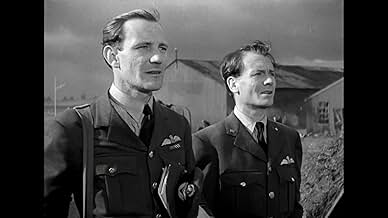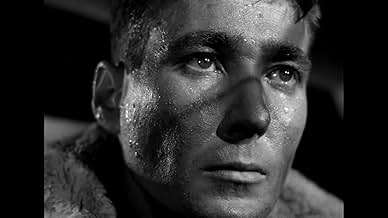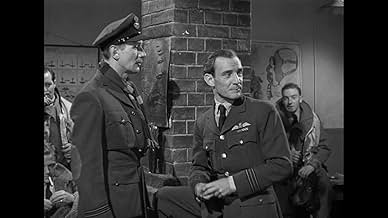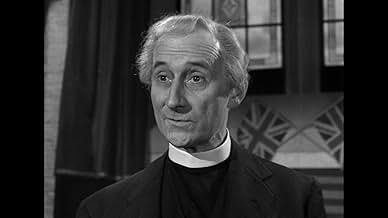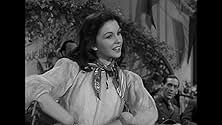NOTE IMDb
7,3/10
1,7 k
MA NOTE
Ajouter une intrigue dans votre langueThe wartime daily routine on a British bomber base in southeastern England is revealed through the eyes of newly arrived Flying Officer Peter Penrose (Sir John Mills).The wartime daily routine on a British bomber base in southeastern England is revealed through the eyes of newly arrived Flying Officer Peter Penrose (Sir John Mills).The wartime daily routine on a British bomber base in southeastern England is revealed through the eyes of newly arrived Flying Officer Peter Penrose (Sir John Mills).
- Réalisation
- Scénario
- Casting principal
- Récompenses
- 1 nomination au total
Renée Asherson
- Iris Winterton
- (as Renee Asherson)
Bonar Colleano
- Joe Friselli
- (as Bonar Colleano Jnr)
Nicholas Stuart
- Col. Rogers
- (as Tryon Nichol)
Bill Owen
- 'Nobby' Clarke
- (as Bill Rowbotham)
Avis à la une
This film was a tribute to the British and American bomber pilots who risked so much during WWII. While it is relatively simple in style, it was a lovely and effective film showing the human side of war. As the movie begins, it is just the British against the Germans in 1940 and a new pilot, John Mills, arrives at the airfield. Old hands, such as the Commander (Trevor Howard) and Michael Redgrave welcome the rookie and the climate is pretty grim. The film then jumps two years and it's 1942--American bomber crews are arriving and excited about getting into the action. A bit later, the film then jumps to 1944--as the war is nearing the end.
While this is a film about bomber crews, no shots of the crews on missions are used and most of the action takes place at a pub next to the base. Here, the crew members unwind and you learn about them as their characters slowly reveal themselves. What I particularly liked is that there were no bigger than life heroes here--just decent men who bravely did their jobs and tried to maintain their sanity through it all. Because of this, the performances were generally understated and realistic--like we are peering through a window into the past. Also, and I don't want to reveal any specifics, I liked how many of the main characters died through the course of the film--heightening both the realism and reminding us just how high the cost was for freedom.
Exceptional acting, writing and direction make this one of the better war films of the era and in many ways is like an aerial version of IN WHICH WE SERVE. Superb.
While this is a film about bomber crews, no shots of the crews on missions are used and most of the action takes place at a pub next to the base. Here, the crew members unwind and you learn about them as their characters slowly reveal themselves. What I particularly liked is that there were no bigger than life heroes here--just decent men who bravely did their jobs and tried to maintain their sanity through it all. Because of this, the performances were generally understated and realistic--like we are peering through a window into the past. Also, and I don't want to reveal any specifics, I liked how many of the main characters died through the course of the film--heightening both the realism and reminding us just how high the cost was for freedom.
Exceptional acting, writing and direction make this one of the better war films of the era and in many ways is like an aerial version of IN WHICH WE SERVE. Superb.
The story is set around an English bomber air base during WWII, which subsequently becomes host to the US 8th air force. The principle characters frequent the local inn, run by 'Toddy', the wife of Flight Lieut. David Archdale.
There is an ensemble of emotions, but the theme concentrates on stiff upper lip stoicism as bomber aircrew are faced with terrible odds of survival, and friends and loved ones make the best of the situation.
The movie was obviously made as a morale booster at the end of the war in Europe and features an outstanding poem that serves as an epitaph to airmen killed in action. The poem is a parody on one written by Heinrich Hoffman, the title translating to `The Story of Johnny Head-In-Air' [1844].
For Johnny
Do not despair for Johnny head-in-air; he sleeps as sound as Johnny underground. Fetch out no shroud for Johnny-in-the-cloud; and keep your tears for him in after years. Better by far for Johnny-the-bright-star, to keep your head and see his children fed. [John Purdey (RAF 1941-1945)]
There is an ensemble of emotions, but the theme concentrates on stiff upper lip stoicism as bomber aircrew are faced with terrible odds of survival, and friends and loved ones make the best of the situation.
The movie was obviously made as a morale booster at the end of the war in Europe and features an outstanding poem that serves as an epitaph to airmen killed in action. The poem is a parody on one written by Heinrich Hoffman, the title translating to `The Story of Johnny Head-In-Air' [1844].
For Johnny
Do not despair for Johnny head-in-air; he sleeps as sound as Johnny underground. Fetch out no shroud for Johnny-in-the-cloud; and keep your tears for him in after years. Better by far for Johnny-the-bright-star, to keep your head and see his children fed. [John Purdey (RAF 1941-1945)]
What an excellent film, with a cast that lifts it above other films made during WW2. Was there a British war film made that did not have John Mills starring in it? Many of the actors here went on to become familiar faces in film and British TV. The story-line and the absence of background music do make this film both nostalgic and entertaining.
It may interest some that the 'Golden Lion' in the film does exist, it is a hotel in Northallerton, North Yorkshire. The street scenes were shot in nearby Bedale. I'm not sure which airfield was used, but it may have been one of the many bomber bases situated in this area, such as Leeming or Dishforth.
It may interest some that the 'Golden Lion' in the film does exist, it is a hotel in Northallerton, North Yorkshire. The street scenes were shot in nearby Bedale. I'm not sure which airfield was used, but it may have been one of the many bomber bases situated in this area, such as Leeming or Dishforth.
Curiously enough, I first came across this film in Halliwell's Film Guide. Idly leafing through the pages, I came across this comment: "..One of the few films which instantly bring back the atmosphere of the war in Britain for anyone who was involved." While the Second World War ended many years before I was born, it sounded interesting and I made a mental note that it might be a good film to watch if ever I had the chance.
Months later, I was looking through my local tv guide in the list of movies that were on. I noticed "The Way to the Stars", and some little bell in the recesses of my memory began to toll. I looked up the movie in my film guide -- and decided that I had to see it.
As it turned out, that was a very happy decision. Others of the Second World War generation might be able to identify with the people and the setting of the film. I cannot, but I loved this movie for all the other reasons -- it really is a wonderful movie, a sad (and heroic) story of people during the war. Critics might provide an analysis of plot, characterisation etc, as a reason why it's such a good movie. I won't bother. I'll merely give this summary: It's one of my favourite films, it deserves to be better known, and you should see it if you get the chance.
Months later, I was looking through my local tv guide in the list of movies that were on. I noticed "The Way to the Stars", and some little bell in the recesses of my memory began to toll. I looked up the movie in my film guide -- and decided that I had to see it.
As it turned out, that was a very happy decision. Others of the Second World War generation might be able to identify with the people and the setting of the film. I cannot, but I loved this movie for all the other reasons -- it really is a wonderful movie, a sad (and heroic) story of people during the war. Critics might provide an analysis of plot, characterisation etc, as a reason why it's such a good movie. I won't bother. I'll merely give this summary: It's one of my favourite films, it deserves to be better known, and you should see it if you get the chance.
Certainly one of the best films to come out of the second world war. Basically the story of a mixture of American and English servicemen placed together on an air force base in England. The film depicts the tragedies of the air crews and their missions over Germany, as well as the comedy side of the English and American airmen each trying to teach the other the game of baseball and cricket. Some superb acting by an outstanding cast. But where oh where can one obtain this splendid movie ???
Le saviez-vous
- AnecdotesThe poem "For Johnny" read by Sir John Mills is as follows: "Do not despair, For Johnny-head-in-air; He sleeps as sound, As Johnny underground. Fetch out no shroud, For Johnny-in-the-cloud; And keep your tears, For him in after years. Better by far, For Johnny-the-bright-star, To keep your head, And see his children fed."
- GaffesAs the American pilot alights to join the first US bombers leaving to bomb the Nazis on "Aug. 17" (1942) his Mae West is visibly stenciled: "Insp 5/3/44" .
- Citations
Squadron Leader Sil Carter: Well, chaps, as you know the target for this afternoon is exactly the same as yesterday's, and the day before yesterday's, and the day before that. Calais. Barge concentrations.
- Crédits fousThe end credits play over a night sky showing a crescent moon and many stars.
Meilleurs choix
Connectez-vous pour évaluer et suivre la liste de favoris afin de recevoir des recommandations personnalisées
- How long is Johnny in the Clouds?Alimenté par Alexa
Détails
- Date de sortie
- Pays d’origine
- Langue
- Aussi connu sous le nom de
- Johnny in the Clouds
- Lieux de tournage
- The Golden Lion Hotel, 114 High Street, Northallerton, North Yorkshire, Angleterre, Royaume-Uni(exteriors of village pub)
- Société de production
- Voir plus de crédits d'entreprise sur IMDbPro
- Durée1 heure 49 minutes
- Couleur
- Rapport de forme
- 1.37 : 1
Contribuer à cette page
Suggérer une modification ou ajouter du contenu manquant

